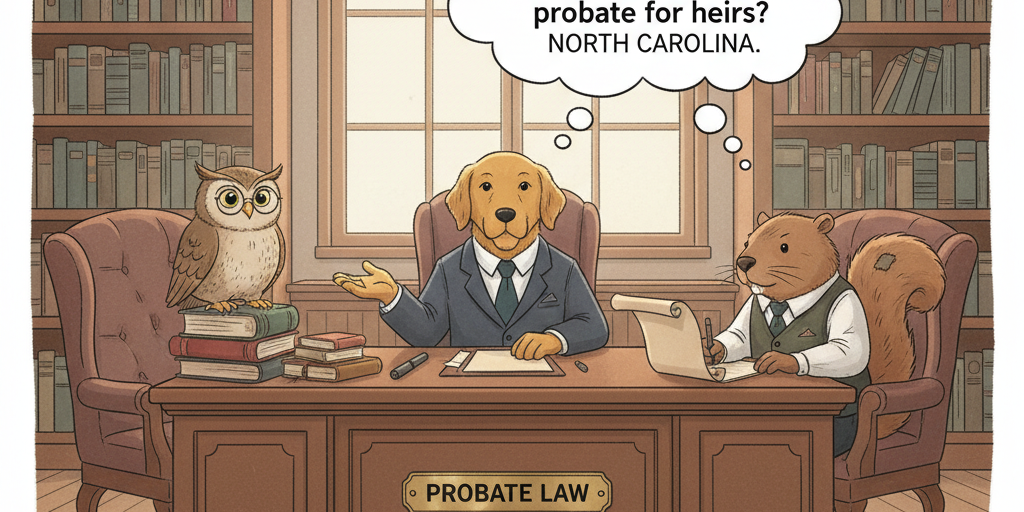Can I list the funds I distributed as administrative expenses to avoid formal probate for heirs? – North Carolina
Short Answer
No. In North Carolina, you cannot reclassify beneficiary distributions as “administrative expenses.” Administrative and attorney fees must be necessary, reasonable, and approved by the Clerk of Superior Court. The clerk audits your accounting and can disallow misclassified payments, require refunds, and hold the personal representative responsible. If a beneficiary died, their share must be handled under the will or North Carolina succession rules, not rerouted as expenses.
Understanding the Problem
You are closing a North Carolina estate and ask if you can report remaining funds as administrative and attorney fees so no further distributions go to heirs. Two intended beneficiaries died, and you already paid their children and took your share. You also paid funeral costs and a former attorney who filed in the wrong county.
Apply the Law
North Carolina requires a personal representative to pay valid costs of administration and approved attorney fees before making distributions. The Clerk of Superior Court audits every account, requires vouchers/receipts, and may approve or deny fees and commissions. Distributions to heirs are not “expenses.” If a named beneficiary dies, you must follow the will’s terms and North Carolina succession rules (including anti-lapse and intestacy). If a deceased beneficiary’s estate has not been opened, payment typically must go to a duly authorized fiduciary for that beneficiary’s estate or as otherwise permitted by law—not directly to relatives without proper authority.
Key Requirements
- Allowable administrative expenses only: Pay necessary, reasonable costs of estate management (e.g., court costs, publication, bond, valid professional fees). Keep vouchers.
- Attorney fees need approval: The clerk reviews reasonableness; fees are not paid in advance and should be supported by itemized time and services.
- Commissions capped and approved: Personal representative commissions are discretionary and cannot exceed 5% of commissionable receipts and disbursements unless the will says otherwise.
- Priority of payments: Administrative costs and approved funeral/burial expenses are paid before general creditor claims and any distributions.
- Accurate accountings and vouchers: Every disbursement needs proof; distributions need signed receipts. Misclassification can be disallowed.
- Deceased beneficiaries: Shares pass per will and North Carolina law (including anti-lapse rules or intestacy) and are often payable to the deceased beneficiary’s estate unless the will directs otherwise.
What the Statutes Say
- N.C. Gen. Stat. § 28A-13-3 (PR powers) – Allows hiring professionals (including attorneys) as needed to administer the estate.
- N.C. Gen. Stat. § 28A-19-6 (Payment priority) – Sets the order for paying administration costs, funeral expenses, and other claims.
- N.C. Gen. Stat. § 28A-23-3 (PR commissions) – Caps commissions and allows clerk review of necessary charges.
- N.C. Gen. Stat. § 28A-21-4 (Order to account) – Lets the clerk order a full accounting and impose remedies for noncompliance.
Analysis
Apply the Rule to the Facts: You cannot convert distributions you already made to beneficiaries (or their descendants) into “administrative expenses.” The clerk will require vouchers for your funeral payment and the prior attorney’s bill and will review whether that fee was necessary and reasonable for the estate. Because two intended beneficiaries died, their shares must be distributed under the will and North Carolina succession rules, often to their estates or, if anti-lapse applies, to their descendants. Paying children directly without legal authority may require correction or refunds.
Process & Timing
- Who files: Personal representative. Where: Clerk of Superior Court (Estates Division) in the county where the decedent was domiciled. What: Final Account (AOC-E-506) with vouchers; Receipts from distributees (AOC-E-521); a written request for allowance of commissions and any attorney fees with itemized support. When: After the notice-to-creditors period ends and all approved claims and expenses are paid.
- If you paid the wrong parties or misclassified items, file an amended account, document actual payees and reasons, and seek fee approval. Be prepared to request refunds or pursue recovery if needed; the clerk can disallow and require repayment.
- For deceased beneficiaries, determine proper takers under the will and North Carolina law. If payment must go to a deceased beneficiary’s estate, obtain proof of appointment for that estate’s fiduciary before making or ratifying payment. The clerk audits and then issues an order approving the account and closing the estate.
Exceptions & Pitfalls
- Attorney fees are not automatic; the clerk may reduce or deny them if they are not necessary or reasonable, especially if prior work did not benefit the estate.
- Do not pay a deceased beneficiary’s share directly to family members unless the will and North Carolina law clearly authorize it and you have proper documentation.
- Early or informal distributions can trigger refund demands, surcharge, or removal if creditors or higher-priority expenses were unpaid.
- Every disbursement needs backup (invoices, receipts, cancelled checks); distributions need signed receipts. Missing vouchers delay approval.
Conclusion
Under North Carolina law, you cannot label beneficiary distributions as administrative expenses to avoid paying heirs. Only necessary, reasonable administration costs and approved attorney fees qualify as expenses, and the clerk reviews them. If beneficiaries died, follow the will and North Carolina succession rules to identify the proper recipients. Next step: file an amended account with the Clerk of Superior Court and a supported request for approval of legitimate commissions and attorney fees before submitting the final account for approval.
Talk to a Probate Attorney
If you’re dealing with disputed expenses, deceased beneficiaries, or a final accounting that needs correction, our firm has experienced attorneys who can help you understand your options and timelines. Call us today at 919-341-7055.
Disclaimer: This article provides general information about North Carolina law based on the single question stated above. It is not legal advice for your specific situation and does not create an attorney-client relationship. Laws, procedures, and local practice can change and may vary by county. If you have a deadline, act promptly and speak with a licensed North Carolina attorney.


